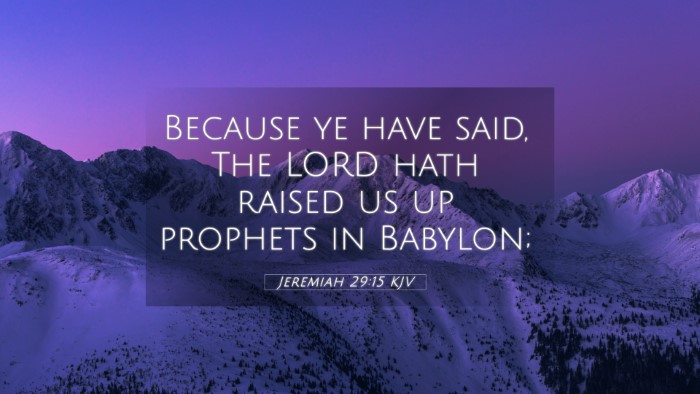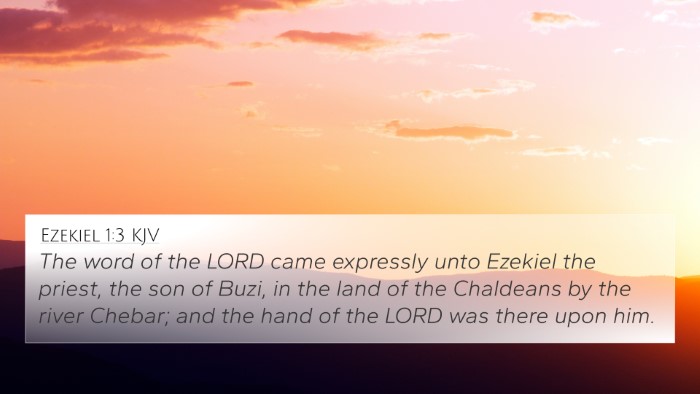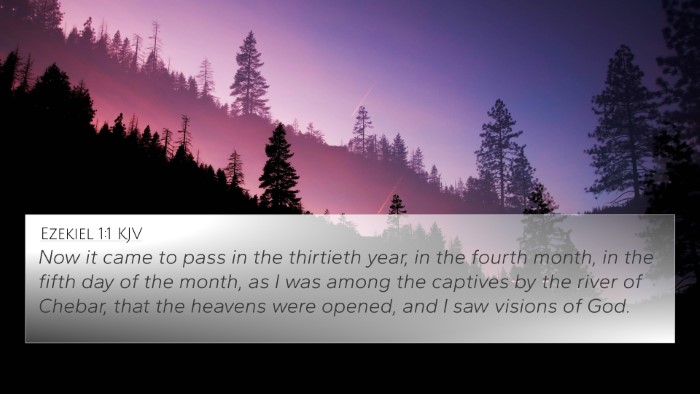Understanding Jeremiah 29:15
Jeremiah 29:15 states, "Because you have said, The Lord has raised us up prophets in Babylon." This verse occurs within a letter from Jeremiah to the exiled inhabitants of Babylon, providing guidance and promoting a hopeful expectation in the midst of their captivity.
Verse Context
To comprehend the meaning of this verse, it is vital to consider its historical context. Jeremiah was addressing the Jewish exiles who were living in Babylon, a situation that was both challenging and filled with uncertainty. The people were longing for God’s reassurance amidst their trials.
Commentary Insights
- Matthew Henry's Commentary: Henry emphasizes that the exiles, in their desperation, mistakenly believed that God had abandoned them. This verse highlights their erroneous assumption, as Jeremiah seeks to clarify that God did indeed deliver a message to them through his prophets.
- Albert Barnes' Notes: Barnes elaborates on the idea of false prophets in Babylon who were providing reassurances without the divine authority. He warns of the repercussions of relying on such misleading messages, contrasting them with the authentic prophecies that Jeremiah delivers.
- Adam Clarke's Commentary: Clarke provides an insight into the significance of prophetic authority. He asserts that true prophetic insight arises from a place of divine inspiration. The exiles’ belief that they had other prophets in Babylon indicates a misunderstanding of God’s ongoing relationship and communication with His people.
Thematic Connections
This verse serves as a focal point for understanding several themes present in Scripture: the challenges of exile, the role of prophetic ministry, and the faithfulness of God despite circumstances.
Bible Verse Parallels
- Isaiah 48:14: This verse warns against listening to false prophets, echoing Jeremiah’s message of caution.
- Ezekiel 13:10-16: Ezekiel similarly speaks against the unreliable prophets in Israel, reinforcing the theme of true versus false prophetic voices.
- 1 Peter 2:9: The call for God’s people to proclaim His excellencies relates to the theme of rightful prophetic identity, contrasting with the exiles' misconception in Jeremiah 29:15.
- Matthew 7:15: Jesus’ admonition about false prophets draws a parallel to Jeremiah’s caution against erroneous prophets, demonstrating an interconnection of Biblical themes across both Testaments.
- 2 Peter 2:1: This verse speaks of false teachers arising among God’s people, emphasizing the need for vigilance similar to what is articulated in Jeremiah 29.
- Jeremiah 23:16-17: In this passage, God declares that many prophets speak lies in His name, further reflecting the societal issues present during the time of the Babylonian exile.
- John 10:5: Jesus contrasts His voice with those of strangers, reminiscent of the confusion among the exiles over true and false prophets.
- Hebrews 13:17: The call to submit to leaders who watch over the souls aligns with the importance of recognizing true prophetic guidance as seen through Jeremiah's warning.
- Revelation 2:2: The Church of Ephesus is commended for testing false apostles, illustrating the ongoing relevance of Jeremiah’s concerns about discernment in prophetic words.
- Acts 20:29-30: Paul’s warning about wolves arising from within the church reinforces the themes presented in Jeremiah regarding prophetic authenticity.
Applications for Study
The study of Jeremiah 29:15 opens the door to a broader understanding of how prophetic voices function within the community of believers. As modern readers of the Bible, some effective tools for cross-referencing and thematic analysis include:
- Bible concordance: Utilize to locate verses that discuss prophetic authority, with cross-references to themes of truth and deception.
- Bible cross-reference guide: This tool can help connect varying scripture on the roles of prophets and the necessity of discernment.
- Cross-reference Bible study: Conduct a study that traces the theme of authentic prophecy through both the Old and New Testaments.
- How to use Bible cross-references: Explore mechanisms for identifying direct and thematic connections across Biblical texts.
- Bible reference resources: Leverage these to enrich understanding of prophetic literature and its implication for today.
Conclusion
Jeremiah 29:15 serves as a poignant reminder of the importance of seeking truth during times of uncertainty. The reflections derived from this verse, bolstered by insights from public domain commentaries, offer valuable lessons about the nature of prophetic messages and the necessity to discern true from false voices in both ancient and contemporary contexts.






